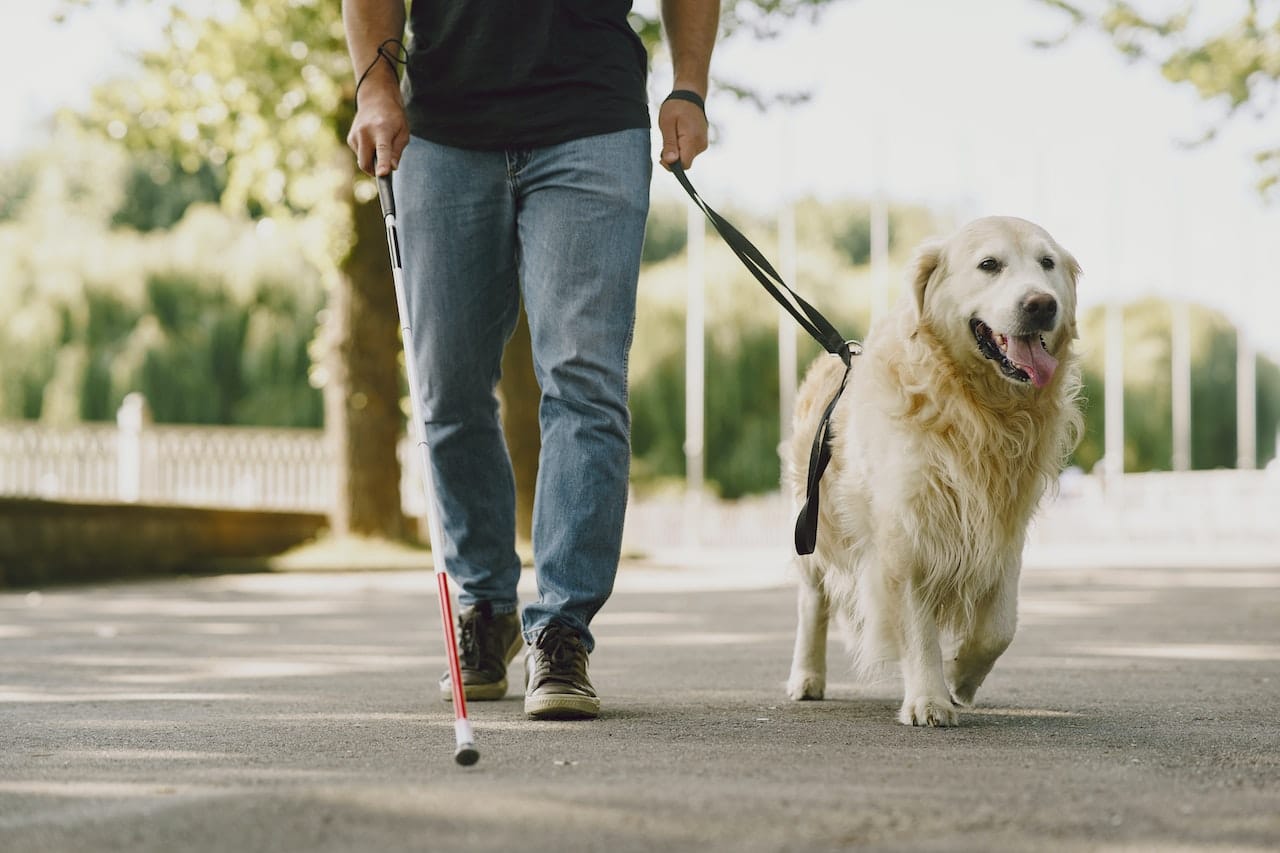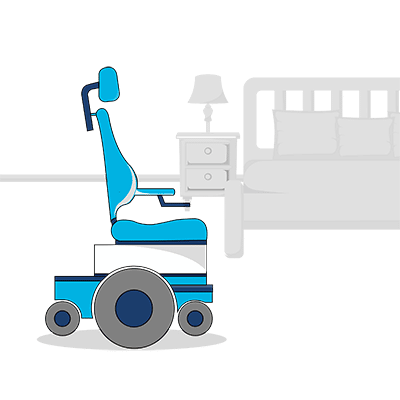Plenty of studies show pets and mental health are linked. Just ask any pet owner whether their beloved companion animal improves their mental health and emotional wellbeing and they’ll undoubtedly say yes.
Pet parents have known it for years and science completely agrees. Your dog, cat, rabbit, guinea pig, bird, or other pet is key to making you happier and healthier.
In this article, Blue Badge Insurance shares five ways our pets and mental health go great together…
In this article
- 1. Pets can help improve depression
- 2. Pets can improve mental health through better sleep
- 3. Pets fulfil the basic human need for touch
- 4. Pets help mental health by facilitating social interaction
- 5. Pets can help with specific disabilities
- What are the best pets for mental health?
- Pets, mental health and insurance
1. Pets can help improve depression
There’s not much better than a loyal furry friend to boost your mood and research backs it up. Studies have shown that pet owners are less likely to suffer from depression than those without pets. The same goes for anxiety and stress.
Pets and mental health really do go hand in hand. Research has shown playing with a pet leads to higher levels of serotonin and dopamine. These are the ‘happy chemicals’ that make you feel calm, relaxed, and content.
And then there’s the sense of structure they bring. A lot of pets – especially dogs – require a consistent and regular routine. They need to be fed and exercised on a regular schedule. This in itself can give you a reason to get out of bed in the mornings.
After all, most dogs and other pets can’t feed or open the door for themselves. Unless you’re the owner of an Assistance Dog, of course!

2. Pets can improve mental health through better sleep
Sleeping with a dog next to you can result in fewer sleep disturbances, according to this study. Plus, cuddling with your dog decreases your cortisol levels – and cortisol is the hormone responsible for keeping us awake.
If you’ve a cat, there’s more good news. Not only does sleeping with them provide you with a sense of content and security, but there’s measurable benefits too. And it’s all in the purr. The vibration actually has healing properties (really)! Their purring can relieve stress and lower blood pressure.
Other things a cat’s purr can help with include:
- Pain reduction
- Muscle growth
- Muscle strain
- Joint flexibility
- Difficulty breathing (dyspnoea)
And then there’s the added benefit that a cat’s purr is kind of like a white noise machine, lulling you into dreamland quickly and calmly. Plus, we can vouch for the fact that having an extra warm body in the bed makes you feel happy and loved.

3. Pets fulfil the basic human need for touch
Humans have an inherent need for touch. And while we respond well to touch from other humans, we also respond well to touch from pets. Almost all small children are enthralled when they see animals and can’t wait to touch them. Even as adults we rely on social touch.
In fact, touch starvation is real. When we don’t get enough social touch, it can have a negative impact on our wellbeing. But luckily our companion animals can help.
Stroking, hugging, patting, and generally touching an animal can make you feel calm and soothed. It’s an effective tool to combat stress. After all, who doesn’t feel better after a hug when you’ve had a particularly bad or stressful day?
Yet again, pets and our mental and emotional wellbeing go together.
4. Pets help mental health by facilitating social interaction
Social interactions often form a major part of our mental and emotional wellbeing. And this is yet another way in which pets and mental health are linked. If you have a dog, for instance, you probably have to exercise it at the local dog park or beach. This means an opportunity to run into a few familiar faces for some quick conversation at the very least.
If your companion animal doesn’t enjoy exercise or playtime outside your property boundary, they can still give you opportunities to socialise. Perhaps posting cats of Instagram photos has led you to connect with like-minded cat lovers? Or joining a passionate online pet community has enabled you to bond with like-minded aficionados of a particular dog breed?
Or maybe, your pet just makes for an interesting topic of conversation when you meet others at various points throughout weekly life. Whatever the case, they can definitely play a role in helping you build social networks and in making conversation.

5. Pets can help with specific disabilities
The positive links between pets and mental and emotional wellbeing are so well accepted that animals are regularly used for therapy, and to aid in living with disability. And we’re not just talking about the obvious things like guide dogs helping the blind.
Pets can also help improve memory in people with dementia. On top of that, a companion animal provides some relief of symptoms like irritability, depression, and agitation.
Horses are frequently used in therapeutic centres too – sometimes for riding, but often just for touch and bonding. Find out what the difference is between an emotional support dog, therapy dog and Assistance Dog.
Assistance animals
Most of us know people with autism often respond well to pets too. Studies have shown that a companion animal can help people living with autism by alleviating loneliness, reducing stress, improving family function, and improving social skills. Read how Assistance Dogs help autism.
There’s no one-size-fits-all answer for how pets can help with specific disabilities. But in various studies, companion animals have been beneficial for a wide range of people living with disabilities that include limited mobility, PTSD, dementia, autism, ADHD, and others.
And that doesn’t even include dogs who can help with conditions like epilepsy and diabetes. But more on that another day! For now, read how Yoda the PTSD dog helps his owner.
What are the best pets for mental health?
Now you know one way to enhance your mental and emotional wellbeing is by welcoming a furry companion into your life. Pets have an incredible ability to provide unconditional love, companionship, and support, which can greatly benefit your overall mental health.
Here are some of the best pets for promoting mental wellbeing…
- Dogs – renowned for their unwavering loyalty and ability to form deep emotional bonds with their owners.
- Cats – if you prefer a more independent yet soothing presence, cats are wonderful companions for mental health. Their gentle purring and comforting presence can help reduce stress and anxiety.
- Fish – a serene environment created by an aquarium can also help reduce stress and anxiety, promoting a sense of peace.
- Small companions – rabbits, guinea pigs, and hamsters can be excellent pets for mental health. These furry pals can bring joy through interactive play and gentle bonding. Their small size and minimal care requirements make them suitable for various living situations.
Finding the best companion animal for your mental health is a personal journey that should be approached with care and consideration. Before welcoming a pet into your life, ensure you have the necessary resources, support and commitment to provide them with a loving and caring home.
With the right pet by your side, you can unlock a world of happiness, support, and improved mental and emotional wellbeing.

More about animals and your wellbeing
If you’re eager to expand your knowledge about all things pet-related, we’ve got you covered. Check out these informative blog posts:
- 3 Big Benefits of Having a Dog or Cat
- Safety Tips for Travelling with Pets in Cars
- Low Maintenance Pets for People with Limited Mobility
- The Many Physical Benefits of Owning a Pet
- Pet Friendly Accessible Accommodation for the Holidays
Pets, mental health and insurance
Your companion animal gives you so much in life – why not give back to them with Blue Badge pet insurance. It will protect your finances so you can make quick, easy decisions around quality medical treatment for your pet.
If you’re living with disability, you might qualify for one of our specialist insurance offerings. Beyond pet insurance (where everyone with a disability parking permit gets a hefty discount) and Assistance Dog insurance, we can insure your mobility equipment like wheelchairs and we have insurance for disability converted cars.
Plus, if you use accessible parking then we offer up to 25% discount on car insurance premiums for disability parking permit holders. Time for a quote?








